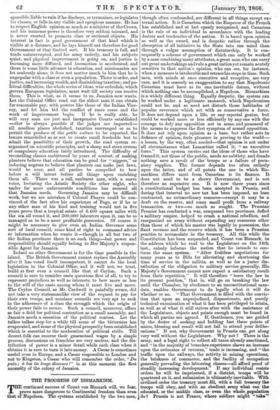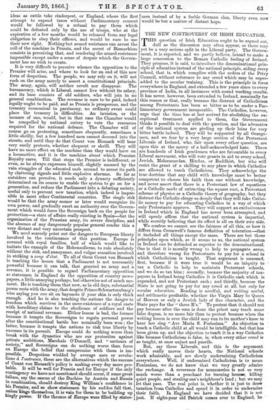THE PROGRESS OF BIBMARKIF3M.
rEcontinued success of Count von Bismark will, we fear, prove more dangerous to Continental freedom than even that of Napoleon. The systems established by the two men, though often confounded, are different in all things except ex- ternal action. It is Cassarisra which the Emperor of the French has established and at last openly recognized, and Onsarisne is the rule of an individual in accordance with the leading desires and tendencies of the nation. It is based upon opinion as well as the sword, and is despotic rather through the absorption of all initiative in the State into one mind than: througha vulgar assumption of dictatorship. It is con- sequently a scheme of government which can only be worked_ by a man combining many attributes, a great man who can carry out great undertakings and rule a great nation y et remain acutely sensitive to that nation's opinion, who can see, for instance, when a measure is intolerable and retracehis steps in time. Such_ men, with minds at once executive and receptive, are very rare, and it is scarcely an exaggeration to say that Napoleonic. 'Cresarism must have as its one inevitable datum, without which nothing can be accomplished, a Napoleon. Bismarkisra. is a widely different thing. Equally despotic, the system can be worked under a legitimate monarch, which Napoleonismi could not be, and so need not disturb those habitudes of popular reverence which act with so conservative a force.. It does not depend upon a life, or any especial genius, but could be worked more or less efficiently by any one with the courage to defy any opposition not in arms, and possessed of the means to suppress the first symptom of armed opposition. It does not rely upon opinion as a base, but rather acts in defiance of opinion, feels pleasure in proving to the world— a lesson, by the way, often needed—that opinion is not under all circumstances what Lamartine called it, " an executive. force." This system carries out the ideas of those who have framed it, not those of the public, needs no subtlety, and dreads: nothing save a revolt of the troops or a failure of pecu- niary supplies. The former depends too often entirely upon the latter, and of all points the one in which Bis- marldsm differs most from Caasarism is its finance. It does not need to be a showy Government, and is not therefore an expensive one. It is now three years since a constitutional budget has been accepted in Prussia, and during that interval no new tax has been imposed, no loan contracted, no extraordinary resource=except it may be a. draft on the reserve, and some small profit from a railway transaction or two—so much as sought. The Prussian- Premier has conducted a war, conquered two provinces, defied_ a military empire, helped to . crush a national rebellion, and reorganized an army without expending any resources other- than those of which his master was legally in possession, the fixed revenue and the reserve which it has been a Prussian practice to accumulate in the treasury. All this while the- Constitution has been suspended, and Count von Biamark, in the address which he read to the Legislature on the 18th_ inst., calmly informs the nation that he intends to con- tinue the same system. "After fruitless negotiations for many years as to Bills for alleviating and shortening the- time of service in the militia, as well as for a juster dis- tribution of the obligation to military service generally, Its. Majesty's Government cannot now expect a satisfactory result from their repetition." It will therefore "leave the law in its present position," that is, will go on breaking the law until the Chamber, by obedience to an unconstitutional man- date, enables Government to do legally what it will do• whether or no. " That Government is filled with the convic- tion that upon an unprejudiced, dispassionate, and purely technical examination of what it has been privileged to attain,. as well as of what it still strives after with the assistance of the Legislature, objects and points enough must be found in which all parties are agreed. If, Gentlemen, you are guided by the desire of . seeking and holding fast these points of union, blessing and result will not fail to attend your delibe- rations." If not, why Government in Prussia can get along- very well without the Legislature. Why not ? There is the army, and a legal right to collect all taxes already sanctioned, and "in the majority of branches experience shows an increase upon the estimates of revenue," trade is increasing, and "the traffic upon the railways, the activity in mining operations, the briskness of commerce, and the facility of occupation generally pervading the labouring classes—all afford proof of steadily increasing development." If any individual resists• orders he will be imprisoned, if a district, troops will be- quartered on it, and submission is ultimately inevitable. With civilized order the treasury must fill, with a full treasury the troops will obey, and with an obedient army what can the educated, or the middle class, or even the whole population dog Prussia is not France, where soldiers might " take" ideas as cattle take rinderpest, or England, where the first attempt to expend taxes without Parliamentary consent would be followed by a refusal to pay them which could be defeated only by the use of troops, who at the expiration of a few months would be released from any legal obligation to obey their officers, and would be sure to use their new right. Nothing but armed resistance can arrest the roll of the machine in Prussia, and the secret of Bismarkism consists in perceiving that, and rendering the armed resistance impossible except under a sense of despair which the Govern- ment has no wish to create.
It is very difficult to perceive whence the opposition to the Premier will arise, and where to look for an end of this new form of despotism. The people, we may rely on it, will not rush on the army merely to assert a constitutional principle. The army, again, will neither revolt nor disappear. The bureaucracy, which is Liberal, cannot live without its salary, and its base consists of old soldiers, who will join in no general combination. The revenue is sure to -be paid, indeed legally-ought to be paid, and as Prussia is prosperous, and the treasury economical to parsimony, no ordinary event could place the treasury in difficulties. An invasion, or the menace of one, would, but in that case the Chamber would be compelled by national outcry to vote the resources required for the national defence. The Chamber will of course go on protesting, sometimes eloquently, sometimes a little shrilly, but a few hundred men cannot descend into the streets, and until they do that Count von Bismark will bear very easily protests, whether eloquent or shrill. They will have no more effect on the machine than they would have on a locomotive, and it is the machine about which Prussian Royalty cares. Till that stops the Premier is indifferent, or even, as he always expresses himself, slightly amused by the vain struggles of the educated mob around to arrest its path by clattering signals and little explosive alarums. So far as outsiders can perceive, it needs only a dynasty sufficiently determined on its course to enable the system to go on for a generation, and reduce the Parliament into a debating society, useful only to prevent new taxation, which indeed is impos- sible in most other Continental countries. The single risk would be that the army sooner or later would recognize its own power, and gradually exert an authority over the Govern- ment Which would force the Sovereign back on the people for protection—a state of affairs really existing in Spain—but the organization of the Prussian army, its severe discipline, and the absence of any dangerously popular general render this a very distant and very uncertain prospect. We need scarcely point out the dangers to European liberty involved in the continuance of this position. Europe is covered with royal families, half of which would like to imitate the example of the Hohenzollerns, to rule absolutely without the risk, and annoyance, and vulgar sensation involved in striking a coup cr "tat. To all of them Count von Bismark is teaching the lesson that a Parliament is not necessarily powerful because it can talk, that granted an army and a revenue, it is possible to regard Parliamentary opposition as statesmen in England do the opposition of country news- papers, a little annoying perhaps, but otherwise not of much mo- ment. He is teaching them that now, as in old days, substantial power rests with the army, that despite Prince Schwartzenburg's wise saying you can sit on bayonets if your skin is only thick enough. And he is also teaching the nations the danger to freedom which survives in the mere existence of a royal caste with hereditary claims to the obedience of soldiers and the receipt of national revenue. Either lesson is bad, the former because it tempts the Sovereigns to regain personal power after the constitutional battle has nominally been won ; the latter, because it tempts the nations to risk true liberty by excesses in its pursuit. Europe could do nothing worse than break with the dynasties who are our protection against private ambitions, Marshals O'Donnell, and " saviours of society," and Sovereigns can do nothing worse than force on Europe the belief that compromise with them is im- possible. Despotism wielded by average men or revolu- tions a routrance, these are the alternatives which the success of Count von Bismark's policy is making every day more pro- bable. It will be well for Prussia and for Europe if the only contingency we have not mentioned should occur, if some great failure, say the rescue of the Duchies by Austria and Russia in combination, should destroy King William's confidence in his Premier, and so show statesmen by his sudden fall that, unless kings themselves, it is vain for them to be building up kingly power. If the thrones of Europe were filled by states- men instead of by a feeble German clan, liberty even now ` would be but a matter of distant hope.































 Previous page
Previous page